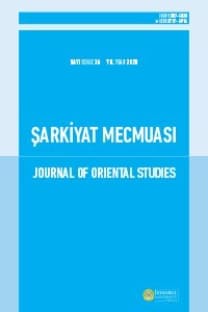Mesnevî’nin Altıncı Defterinden Bir Örnekle Edebiyatın Sinemaya Uyarlanmasında Senaryo Yazımının Klasik Paradigması
sinema, edebiyat, uyarlama, Mesnevî, Klasik senaryo pradigması
The Classic Paradigm of Screenwriting in the Cinematic Adaptation of Literature: An Example From the Sixth Book of Rumi’s Masnavi
Cinema, Literature, Adaptation, Masnavi, Screenplay classic paradigm,
___
- Mevlevî, Celâleddîn Muhammed b. Muhammed. Mesnevî-yi Ma’nevî. Tashîh Reynold Nicholson. Tehrân: Neşr-î Peymân, 1380.
- Field, Syd. Râhnomâ-yi Fîlmnâmenevîs. Tercome ‘Abbâs Ekberî. Tehrân: Neşr-i Sâkî, 1378.
- Tierno, Michael. Poetika-yi Aristo beraî Fîlmnâmenevîsân. Tercome Muhammed Gozerâbâdî. Tehrân: Neşr-i Sâkî, 1389.
- İsmâîlî, Sâm, “Makâle-yi Dâstân”, Mecelle-yi Fârâbî: Vîjenâme-yi Rivâyet u Zıdd-i Rivâyet, Tercome Mensûr Barâhîmî. Tehrân: Neşr-i Fârâbî (1377): 39-49. V
- ogler, Christopher. Sefer-i Nevîsende. Tercome Muhammed Gozerâbâdî. Tehrân: Neşr-i Mînûy-i Hired, 1391.
- Aristo, Poetika/Trajedi. Tercome Helen Ouliaeinia. İsfahân: Neşr-i Ferdâ, 1386.
- Campbell, Joseph. Kahramân-i Hezâr Çehre. Tercome Şâdî Hosrev Penâh. Meşhed: Neşr-i Gol-i Âftâb, 1389.
- Dancyger, Ken; Rush, Jeff. Fîlmnâmenevîsî-yi Motefâvet. Tercome Muhammed Şehbâ. Tehrân: Neşr-i Hermes, 1393.
- Pfister, Manfred. Nazariyye u Tahlîl-i Derâm. Tercome Mehdî Nasrullahzâde. Tehrân: Neşr-i Mînûy-i Hired, 1387.
- Kahrâbî, Şehrâm. Olgû-yi Peykerbendî-yi Fîlmnâmehâ-yi Movaffak: ber esâs-i Olgû-yi Gostereş-i İde-yi Dâstânî. Tehrân: Neşr-i Efrâz, 1391.
- Truby, John. Ânatomî-yi Dâstân (22 Gâm tâ Ostâd Şoden der Dâstângûyî). Tercome Muhammed Gozerâbâdî. Tehrân: Neşr-i Sâkî, 1392.
- Hoseynî, Seyyid Hasan. Moşt der Nomâ-yi Doroşt. Tehrân: Surûş, İntişârât-i Sedâ u Sîmâ, 1388.
- ISSN: 1307-5020
- Yayın Aralığı: 2
- Başlangıç: 1956
- Yayıncı: İstanbul Üniversitesi Edebiyat Fakültesi Şarkiyat Araştırma Merkezi
Türk Öğrencilerin Çince Okuduğunu Anlama Becerisi Gereksinim Çözümleme Çalışması
Sâdık Bey Afşâr’ın Mecma‘ü’l-Havâs Neşri Üzerine Gelen Eleştirilerin İncelenmesi
İntizar Hüseyin’in Öykü Yazarlığı
Farsça Fiilimsi Yan Tümcenin Sözdizimsel Yapısı
Arap Şiirinde Zaruretten Kaynaklanan Ziyadeler
Emevi Döneminde Ahlaki Şiirde İç Kafiyelerin Tezahürleri: Teknik Bir Çalışma
Çağdaş Bir Ebû Tâlib: Reşîd Selîm el-Hûrî (Korku ve Kompleks)
İran Mitolojisi Üzerine Bir Okuma: Sîmîn Dânişver’in Sevûşûn Adlı Romanı
Kur’ân-ı Kerim’de Geçen İhkâm ve İtkân Lafızları Arasındaki Anlam Farklılıkları
